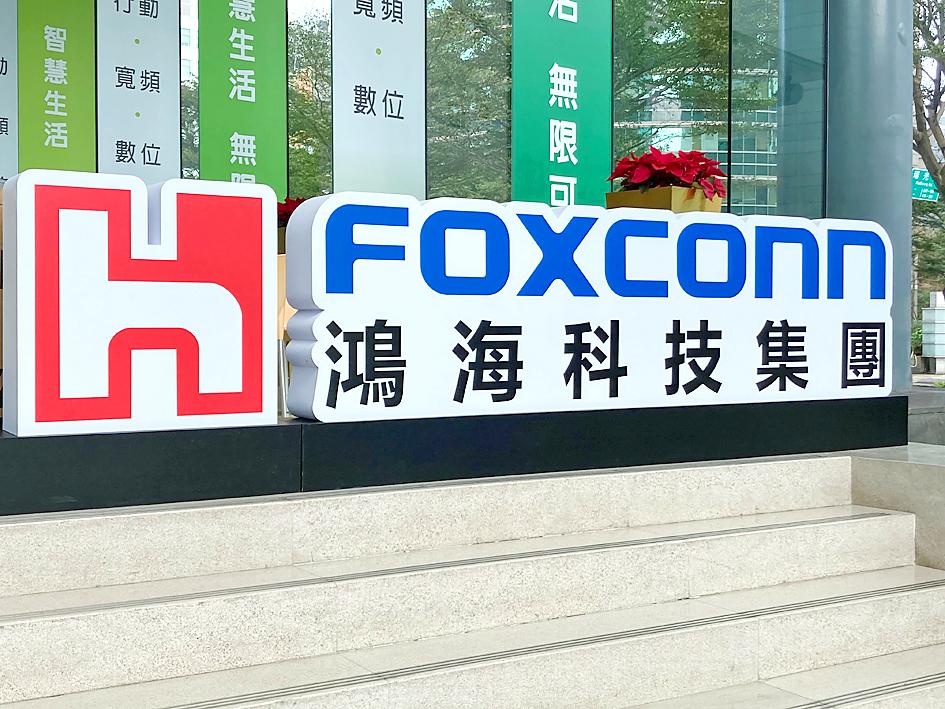Hon Hai Precision Industry Co (鴻海精密) is developing a faster-charging, longer-lasting battery for electric vehicles (EV) using lithium iron phosphate thanks to new developments in anode materials, the company said yesterday.
The remark came after the world’s largest electronics contract manufacturer signed a memorandum of understanding (MOU) with partners Giga Solar Materials Corp (碩禾電子), Long Time Technology Co (榮炭科技) and China Steel Chemical Corp (中鋼碳素) to “accelerate the development of anode materials for the next generation of made-in-Taiwan EV batteries.”
The key materials for such batteries are mesocarbon microbeads (MCMB), which China Steel Chemical manufactures, silicon oxide, which Giga Solar produces, and artificial graphite, which Long Time Technology provides, the MOU said.

Photo: Chen Rou-chen, Taipei Times
China Steel Chemical is the world’s biggest manufacturer of MCMBs, and it is in good control of upstream materials and proprietary technology for the manufacturing process, Hon Hai said.
“We anticipate that our partnership would help Hon Hai establish a strong place in the global EV battery supply chain and become widely used in electric vehicles, electric buses and battery storage applications,” it said.
The first application for the new lithium iron phosphate battery would be in electric buses, which the company has scheduled to reach the market in 2023, Hon Hai said.
Hon Hai has invested heavily in the EV space.
Its first electric bus is to be delivered in the second quarter of next year.
Hon Hai has stakes in Long Time Technology and Giga Solar Materials.
China Steel Chemical is a subsidiary of China Steel Corp (中鋼) that focuses on specialty chemicals for the production of steel.

Vincent Wei led fellow Singaporean farmers around an empty Malaysian plot, laying out plans for a greenhouse and rows of leafy vegetables. What he pitched was not just space for crops, but a lifeline for growers struggling to make ends meet in a city-state with high prices and little vacant land. The future agriculture hub is part of a joint special economic zone launched last year by the two neighbors, expected to cost US$123 million and produce 10,000 tonnes of fresh produce annually. It is attracting Singaporean farmers with promises of cheaper land, labor and energy just over the border.

US actor Matthew McConaughey has filed recordings of his image and voice with US patent authorities to protect them from unauthorized usage by artificial intelligence (AI) platforms, a representative said earlier this week. Several video clips and audio recordings were registered by the commercial arm of the Just Keep Livin’ Foundation, a non-profit created by the Oscar-winning actor and his wife, Camila, according to the US Patent and Trademark Office database. Many artists are increasingly concerned about the uncontrolled use of their image via generative AI since the rollout of ChatGPT and other AI-powered tools. Several US states have adopted

A proposed billionaires’ tax in California has ignited a political uproar in Silicon Valley, with tech titans threatening to leave the state while California Governor Gavin Newsom of the Democratic Party maneuvers to defeat a levy that he fears would lead to an exodus of wealth. A technology mecca, California has more billionaires than any other US state — a few hundred, by some estimates. About half its personal income tax revenue, a financial backbone in the nearly US$350 billion budget, comes from the top 1 percent of earners. A large healthcare union is attempting to place a proposal before

KEEPING UP: The acquisition of a cleanroom in Taiwan would enable Micron to increase production in a market where demand continues to outpace supply, a Micron official said Micron Technology Inc has signed a letter of intent to buy a fabrication site in Taiwan from Powerchip Semiconductor Manufacturing Corp (力積電) for US$1.8 billion to expand its production of memory chips. Micron would take control of the P5 site in Miaoli County’s Tongluo Township (銅鑼) and plans to ramp up DRAM production in phases after the transaction closes in the second quarter, the company said in a statement on Saturday. The acquisition includes an existing 12 inch fab cleanroom of 27,871m2 and would further position Micron to address growing global demand for memory solutions, the company said. Micron expects the transaction to